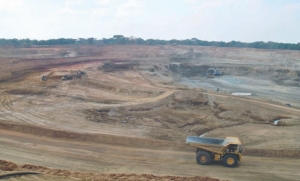VANCOUVER — The situation in the Democratic Republic of the Congo (DRC) has gone from bad to worse for First Quantum (FM-T, FQM-L) after the country’s Supreme Court made a ruling that seemingly invalidates the mining rights for the company’s Frontier and Lonshi copper mines.
The recent development comes after First Quantum launched international arbitration against the DRC government in early February in response to the government’s cancellation of its Kolwezi copper-cobalt tailings project. Philip Pascall, chief executive of First Quantum, said the recent suspensions are possibly in retaliation.
“We know that our international arbitration case on the Kolwezi tailings project is not liked and there have been some threats that our other prospects in (the) Congo will be targeted if we didn’t withdraw,” said Pascall in a conference call. “It’s very disappointing and has obviously been the subject of some concern.”
The company asserts that its titles for Frontier and Lonshi are not being directly challenged and were awarded legitimately under the new mining code. The problem stems from a decision by the DRC government in 2000 to suspend certain exploration rights of the state-owned mining company SODIMICO.
Years later, when the new mining code came in, title holders were required to either get new licenses or have their licenses transferred. First Quantum, according to Pascall, had its common law rights transferred into formal licenses, while SODIMICO did not make any claims at the time.
“In that sense it’s an absolutely proper title that’s issued in terms of the mining code,” said Pascall.
The Supreme Court, however, nullified the original letter that suspended SODIMICO’s rights to the area. In the May 14 hearing, the DRC government, the main defendant in the case, made no defence of the matter. Neither First Quantum nor its subsidiaries were notified of the hearing. The company is now waiting to find out what exactly the implications are of such a decision.
News of the decision drove the company’s stock price down $7.43 or 11.8% to $55.36 on June 1.
As to the operations themselves, Pascall said the Frontier mine was operating “perfectly, steadily and normally,” though the possibility of future closure was of concern. The Lonshi open-pit mine was depleted in 2008 but a feasibility study is nearly complete for an underground operation.
In the meantime, Pascall said the company was committed to finding a solution.
“We will pursue every avenue that we can to resolve this matter amicably and, to resolve it in general, because the amount of effort and investment we’ve put in there, we think sets us as being a responsible investor in the place and an investor that can benefit from a continued presence there.”
Pascall pointed out First Quantum’s positive effects on the country, most notably the US$55 million in tax the company recently paid. Pascall said this was the largest tax payment ever made to the government and about 10 times what any other company paid. He also noted that Frontier was recently given an award for being the “best and most socially responsible” company in the DRC. He said many in the country are very supportive of the company and its projects.
“In our opinion the activities on the legal side come from a fairly small group of very influential players in the DRC and don’t necessarily mirror the sentiments of a number of the other authorities and Congolese at large,” said Pascall.
First Quantum’s operations in the DRC account for roughly 25% of its global operations. The company has been working to diversify itself both in terms of geography and commodities and is committed to further diversification. First Quantum recently completed the acquisition of the Ravensthorpe nickel mine in Australia for US$340 million and of Kiwara PLC, owner of the Kalumbila copper deposit in Zambia for US$260 million.
Pascall, however, re-asserted the company’s commitment to the DRC and his faith that the problems there will be resolved.
“We have in the past encountered such disappointments elsewhere and through perseverance and persistence and doing things the right way, we have ultimately enhanced our reputation and prospered.”


Be the first to comment on "More setbacks for First Quantum in the DRC"